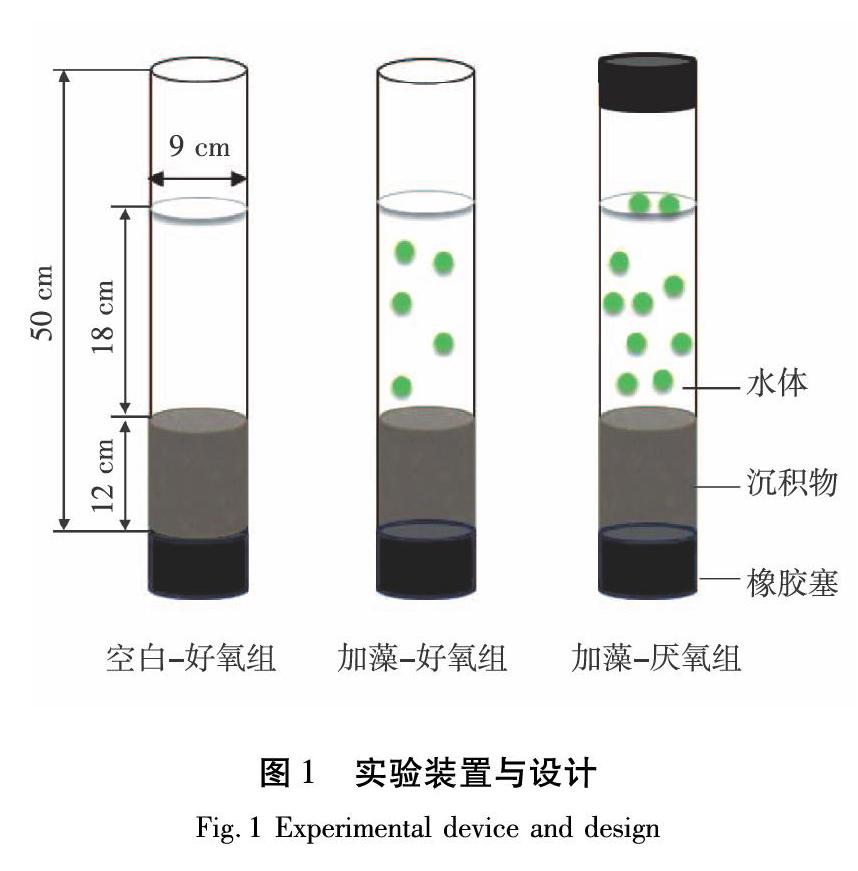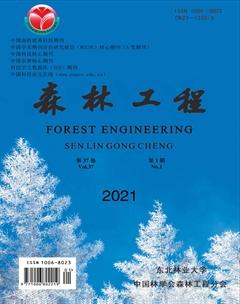绿藻消亡过程对上覆水磷形态含量的影响
蔡婕 韩超南 孙宁宁 严格


摘 要:以太湖沉积物样品和浓缩绿藻等为试材进行室内柱培养实验,研究绿藻消亡分解条件下上覆水pH、溶解氧(DO)、总磷(TP)、总溶解态磷(TDP)和活性磷酸盐(PO3-4)等含量的动态变化。结果表明,厌氧培养下绿藻等死亡速率相比好氧培养更快,且藻体消亡过程中耗O2产CO2、释放小分子有机酸作用使之上覆水DO、pH明显下降。“空白-好氧”组上覆水PO3-4、TDP含量在1~20 d内明显上升,说明好氧条件下沉积物仍会释放部分磷进入上覆水;“加藻-好氧”组PO3-4含量在10~20 d内才升高,主要因培养后期绿藻死亡分解释放磷而引起;“加藻-厌氧”组PO3-4、TDP含量变化较小,可能与后期藻体残渣、悬浮物质吸附PO3-4作用有关,后续需进一步深入探讨。研究表明,绿藻分解能明显降低水体DO、pH,且能释放磷进入水体,但不同培养条件绿藻分解释放磷的时期有一定差异。
关键词:绿藻;藻体分解;上覆水;磷形态;溶解氧
中图分类号:X524 文献标识码:A 文章编号:1006-8023(2021)01-0028-04
Abstract:Sediment samples and concentrated green algae from Taihu Lake were used as experimental materials for indoor column culture. Under the influence of algae decomposition, the dynamic variations of pH, dissolved oxygen (DO), total phosphorus (TP), total dissolved phosphorus (TDP) and active phosphate (PO3-4) in overlying water were studied. The results showed that the death rate of green algae in anaerobic culture was faster than that in aerobic culture. The process of algal death gradually consumed oxygen, produced carbon dioxide and even released small molecular organic acids, which made the DO and pH in overlying water of “algal anaerobic” group decrease obviously. During the column culture period (1-20 d), the concentrations of PO3-4 and TDP in overlying water of “blank aerobic” group increased significantly, indicating that parts of sediment phosphorus were released into the overlying water under aerobic culture environment. Whereas PO3-4 concentrations in overlying water of “algae aerobic” group only increased within 10-20 d, which was mainly caused by phosphorus release from algae decomposition in the later stage of column culture. Relatively, PO3-4 and TDP concentrations in overlying water of “algal anaerobic” group in the 10-20 d changed little. These may be related to the adsorption of PO3-4 by algae residue and suspended matter in overlying water during the later stage of column culture, which needed further study. The study indicated that green decomposition could obviously reduce DO, pH in water and release phosphorus into water, but there were some differences in the period of phosphorus release under different culture conditions.
Keywords:Green algae; algae decomposition; overlying water; phosphorus forms; dissolved oxygen
0 引言
磷是水體不可或缺的限制性营养元素,对于水环境中各类能量循环有着重要作用。当水环境中含磷量过多时,水体容易趋于富营养化,藻类吸收氮、磷营养盐而过量繁殖,形成大面积的水华,引起水质恶化而威胁饮用水供水安全[1]。水华消退时期,大量藻类死亡分解会释放氮、磷等物质进入水体[2],同时也将驱动沉积物与水体间磷、铁等元素迁移转化[3],从而破坏了水体原本的生态系统平衡。因此,水华暴发过程和消亡过程直接影响或参与水环境中磷循环。
近年来水华生消对水体磷循环的影响已逐渐成为当前研究的热点。研究表明,蓝藻水华消亡分解不仅可以直接釋放磷营养物质,而且可以通过产出硫化物来间接促进沉积物铁结合态磷的还原释放[4]。实际上除湖泊蓝藻水华之外,绿藻、裸藻和隐藻等水华在淡水养殖的池塘中常有发生,对养殖生产造成较大的损失[5]。目前针对蓝藻水华生消过程引起的生态效应研究较多[6-7],而对绿藻、裸藻和小球藻等藻体死亡分解对水环境的影响研究鲜有报道。本研究通过室内柱培养实验,研究混合藻体(绿藻、裸藻、栅藻)消亡过程中水体多种磷形态含量的动态变化,以探讨绿藻等藻体分解对沉积物-水环境中磷迁移转化的影响,为水产养殖池塘水华防控提供科学依据。
1 实验设计和测定
采用有机玻璃圆柱(高50 cm、直径9 cm),在实验室搭建“藻-水-沉积物柱培养体系”。实验所用沉积物材料取自太湖湖底,去除杂质后充分混合备用。购置绿藻、栅藻和裸藻的混合藻种,经离心浓缩后作为藻体材料。柱体下部装入厚约12 cm沉积物层,上部注入高约18 cm去离子水,装好12根后静置平衡2周(图1)。实验共设置“空白-好氧” “加藻-好氧” “加藻-厌氧”3组培养条件(每组4根柱子),3组柱体中分别加入浓缩藻体0、2.5、5 mL,前两组上部敞口好氧培养,后一组上部封盖厌氧培养,培养20 d。
分别于第1、5、10、20 d,采用多参数水质分析仪测定3组上覆水的pH、溶解氧(DO)和水温,同时吸取部分上覆水样备用待测。取一定体积的上覆水经0.45 μm滤膜过滤,过滤水样、原水样采用“过硫酸钾消解+钼锑抗分光光度法”[8]分别测定总溶解态磷(TDP)、总磷(TP)含量;过滤水样采用“钼锑抗分光光度法”[8]测定磷酸盐(PO3-4)含量;过滤后的滤膜经90%丙酮溶液提取后采用分光光度法[9]测定叶绿素a(Chla)含量。将水体TP与TDP含量差值作为水体总颗粒态磷(TPP)含量。
2 结果与讨论
2.1 上覆水水质参数的变化特征
柱培养期间,上覆水Chla、DO和pH的变化情况如图2所示。从藻体投加至第20 d,两个加藻组上覆水Chla含量均逐渐降低至0 mg/L,其中厌氧培养下的“加藻-厌氧”组藻体在1~10 d内的死亡速率大于“加藻-好氧”组。随着气温的降低,柱培养体系中上覆水的水温逐渐从19 ℃降至7.6 ℃。由于水温降低,大气中O2向水体渗透增加,从而“空白-好氧” “加藻-好氧”组上覆水DO含量在1~20 d缓慢升高至7.8 mg/L。“加藻-厌氧”组上覆水DO含量在1~10 d内从4.4 mg/L降至2.9 mg/L。1~10 d内“加藻-厌氧” 组藻体迅速死亡,呼吸作用会消耗水体O2,这应该是造成该组上覆水DO降低的原因。
从pH变化来看,“加藻-厌氧”组的加藻量最多,培养初期(1~5 d)其上覆水pH大于“加藻-好氧” “空白-好氧”组,但培养后期(10~20 d)其上覆水pH却小于“加藻-好氧” “空白-好氧”组。培养后期,藻体消亡过程中不仅会消耗水体O2产生CO2[10],而且还会分解释放小分子有机酸类物质[11],从而使得“加藻-厌氧”组柱体系上覆水pH明显下降。
2.2 上覆水磷形态的变化特征
柱培养期间,上覆水磷形态含量的变化情况如图3所示。培养期间上覆水TP含量由大到小依次为:“加藻-厌氧”(0.15~0.23 mg/L)、“加藻-好氧”(0.09~0.12 mg/L)、“空白-好氧”(0.03~0.08 mg/L),而上覆水TDP、PO3-4含量分布与TP相反。3组柱体系上覆水磷形态组成差异较大,“空白-好氧”组上覆水以TDP为主要磷形态,TDP占TP含量组成的50%~100%。然而,“加藻-厌氧”和“加藻-好氧”组上覆水以TPP为主要磷形态,TPP占TP含量组成的86%~97%和52%~92%。对比来看,藻体投加是引起“加藻-厌氧” “加藻-好氧”组上覆水TPP及TP含量较高的主要原因。
“空白-好氧”组上覆水TP含量在1~20 d内呈缓慢上升特征,主要由其TDP、PO3-4含量升高所引起。这说明,好氧环境下,柱体系中沉积物仍然释放了部分磷进入上覆水。对于“加藻-好氧”组上覆水TP含量在1~20 d变化不大,TDP含量波动上升,PO3-4含量则先下降后上升。培养初期(1~10 d),投加的绿藻等藻体需要吸收PO3-4以维持自身生存[12],从而造成“加藻-好氧”组上覆水PO3-4含量下降;在培养后期(10~20 d),约90%的投加藻体已消亡,除了沉积物释放磷之外,藻体分解过程会释放部分PO3-4和TDP[13-15],从而造成“加藻-好氧”组PO3-4含量又升高。
“加藻-厌氧”组上覆水TP含量在1~20 d内呈下降特征,主要是由藻体消亡沉降引起TPP含量降低而造成的。“加藻-厌氧”组投加藻量是“加藻-好氧”组的2倍,但在培养后期藻体消亡分解并没有导致“加藻-厌氧”组TDP、PO3-4含量明显升高,原因可能是藻体残渣、悬浮物质对上覆水PO3-4的吸附作用所引起[16-20],具体还需要后续进一步深入研究。
3 结论
(1)厌氧培养下,投加绿藻等在1~10 d内的死亡速率大于好氧培养组,且藻体消亡过程中呼吸耗O2产CO2、释放小分子有机酸作用导致上覆水DO含量、pH明显下降。
(2)1~20 d内“空白-好氧”组上覆水PO3-4、TDP含量呈明显上升特征,说明好氧环境中沉积物仍释放了部分磷进入上覆水。
(3)培养初期(1~10 d)绿藻等吸收PO3-4维持生存导致“加藻-好氧”组上覆水PO3-4含量下降,后期(10~20 d)PO3-4、TDP含量又上升,主要由绿藻等消亡分解释放磷所致。
(4)培養后期(10~20 d)藻体分解释磷作用下,“加藻-厌氧”组上覆水PO3-4、TDP含量并未明显升高,可能与藻体残渣、悬浮物质吸附PO3-4作用有关。
【参 考 文 献】
[1]吴庆龙,谢平,杨柳燕,等.湖泊蓝藻水华生态灾害形成机理及防治的基础研究[J].地球科学进展,2008,23(11):1115-1123.
WU Q L, XIE P, YANG L Y, et al. Ecological consequences of cyanobacetrial blooms in lakes and their countermeasures[J]. Advances in Earth Science, 2008, 23(11): 1115-1123.
[2]GARCI A-ROBLEDO E, CORZO A. Effects of macroalgal blooms on carbon and nitrogen biogeochemical cycling in photoautotrophic sediments: an experimental mesocosm[J]. Marine Pollution Bulletin, 2011, 62(7): 1550-1556.
[3]CHEN M S, DING S M, CHEN X, et al. Mechanisms driving phosphorus release during algal blooms based on hourly changes in iron and phosphorus concentrations in sediments[J]. Water Research, 2018, 133: 153-164.
[4]ZHAO Y P, ZHANG Z Q, WANG G X, et al. High sulfide production induced by algae decomposition and its potential stimulation to phosphorus mobility in sediment[J]. Science of the Total Environment, 2019, 650: 163-172.
[5]刘国祥.水产养殖池塘裸藻水华的特点、危害和调控[J].中国水产,2009,51(2):59-60.
LIU G X. Characteristics, harm and control of gymnophyta bloom in aquaculture ponds [J]. China Fisheries, 2009, 51(2): 59-60.
[6]刘德富,杨正健,纪道斌,等.三峡水库支流水华机理及其调控技术研究进展[J].水利学报,2016,47(3):443-454.
LIU D F, YANG Z J, JI D B, et al. A review on the mechanism and its controlling methods of the algal blooms in the tributaries of Three Gorges Reservoir[J]. Journal of Hydraulic Engineering, 2016, 47(3): 443-454.
[7]DING S M, CHEN M S, GONG M D, et al. Internal phosphorus loading from sediments causes seasonal nitrogen limitation for harmful algal blooms[J]. Science of the Total Environment, 2018, 625: 872-884.
[8]魏复盛.国家环境保护总局,水和废水监测分析方法编委会.水和废水监测分析方法[M].4版.北京:中国环境科学出版社,2002.
WEI F S, National Environmental Protection Agency, Editorial Board of Water and Wastewater Monitoring and Analysis Methods. Monitoring and analysis methods for water and wastewater[M]. 4th ed. Beijing: China Environment Science Press, 2002.
[9]中华人民共和国生态环境部.水质叶绿素a的测定分光光度法HJ897—2017[S].北京:中国环境出版社,2017.
Ministry of Environmental Protection of the Peoples Republic of China. Water quality-determination of chlorophyll a -spectrophotometric method HJ 897-2017[S]. Beijing: China Environment Press, 2017.
[10]朱瑾灿,吴雨琛,尹洪斌.太湖蓝藻聚集区沉积物硫形态的时空变异特征[J].中国环境科学,2017,37(12):4690-4700.
ZHU J C, WU Y C, YIN H B. Temporal and spatial variations of sulfur speciations in the sediments of algae accumulation area in Lake Taihu[J]. China Environmental Science, 2017, 37(12): 4690-4700.
[11]FENG Z Y, FAN C X, HUANG W Y, et al. Microorganisms and typical organic matter responsible for lacustrine “black bloom”[J]. Science of the Total Environment, 2014, 470/471: 1-8.
[12]侯金枝,魏权,高丽,等.刚毛藻分解对上覆水磷含量及赋存形态的影响[J].环境科学,2013,34(6):2184-2190.
HOU J Z, WEI Q, GAO L, et al. Influence of decomposition of Cladophora sp. on phosphorus concentrations and forms in the overlying water[J]. Environmental Science, 2013, 34(6): 2184-2190.
[13]孙远军.淀山湖蓝藻碎屑的好氧降解和营养盐释放规律研究[J].中国环境科学,2013,33(11):2047-2052.
SUN Y J. Study on the aerobic decomposition and nutrient release of cyanobacteria detritus in Dianshan Lake[J]. China Environmental Science, 2013, 33(11): 2047-2052.
[14]CHUAI X M, DING W, CHEN X F, et al. Phosphorus release from cyanobacterial blooms in Meiliang Bay of Lake Taihu, China[J]. Ecological Engineering, 2011, 37(6): 842-849.
[15]孙宁宁,陈蕾.湖泊沉积物磷释放的影响因素研究进展[J].应用化工,2020,49(3):715-718.
SUN N N, CHEN L. Research progress on the influence factors of sediment phosphorus release in lake[J]. Applied Chemical Industry, 2020, 49(3): 715-718.
[16]陈俊,李勇,李大鹏,等.藻类与扰动共存下水体中不同形态磷的数量分布规律[J].环境科学,2016,37(4):1413-1421.
CHEN J, LI Y, LI D P, et al. Distribution of phosphorus forms in the overlying water under disturbance with the addition of algae[J]. Chinese Journal of Environmental Science, 2016, 37(4): 1413-1421.
[17]丁丽花,顾艳,罗康宁,等.洪泽湖淮河入湖河口区群落间营养元素分布特征[J].南京林业大学学报(自然科学版),2020,44(3):111-118.
DING L H,GU Y,LUO K N,et al.The allocation of nutrient elements among plant communities in estuary of Huaihe River in Hongze Lake[J].Journal of Nanjing Forestry University(Natural Science Edition),2020,44(3):111-118.
[18]GAO Y, LIANG T, TIAN S H, et al. High-resolution imaging of labile phosphorus and its relationship with iron redox state in lake sediments[J]. Environmental Pollution, 2016, 219: 466-474.
[19]趙香香,韩超南,吴昊,等.藻体分解对沉积物-水中硫迁移转化的影响[J].森林工程,2020,36(6):36-41.
ZHAO X X, HAN C N, WU H, et al. Influence of algal decomposition on the migration and transformation of sulfides in overlying water and sediment[J]. Forest Engineering, 2020, 36(6): 36-41.
[20]黄晓江,王郑,李子木,等.煤质活性炭对水中硼离子的吸附性能研究[J].森林工程,2019,35(1):101-105.
HUANG X J, WANG Z, LI Z M, et al. Adsorption properties of coal activated carbon for boron ion in water[J]. Forest Engineering, 2019, 35(1): 101-105.

